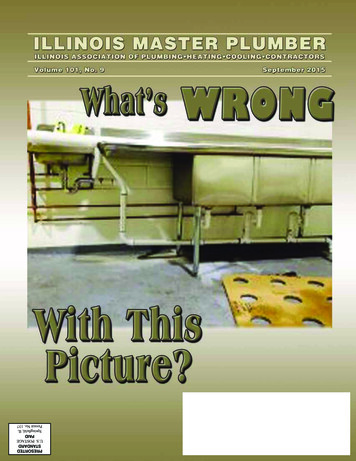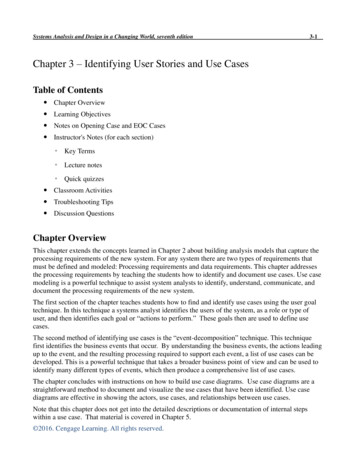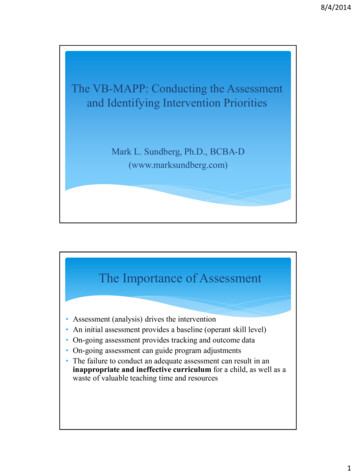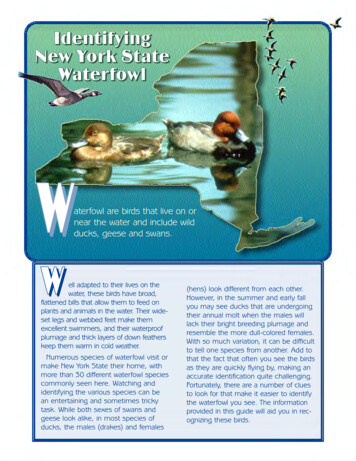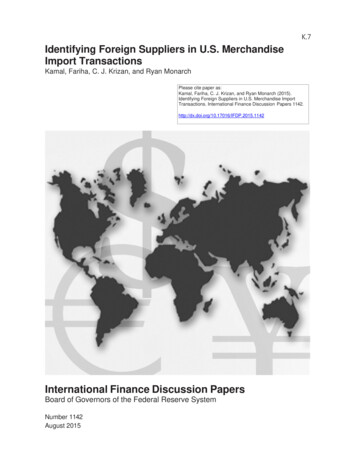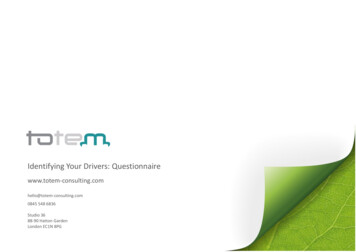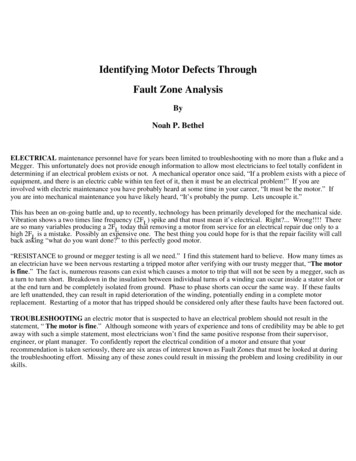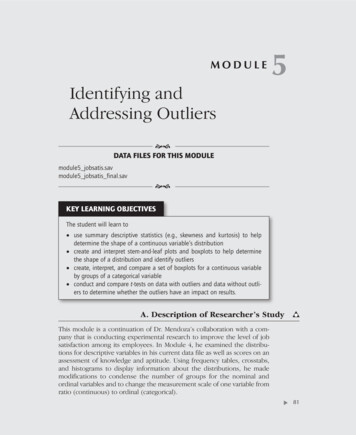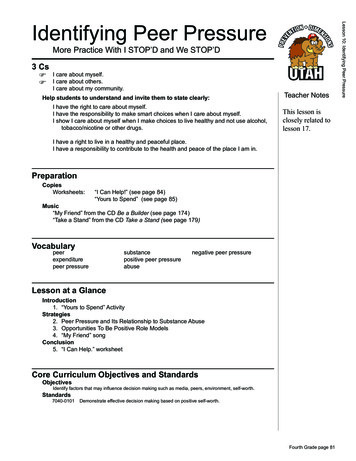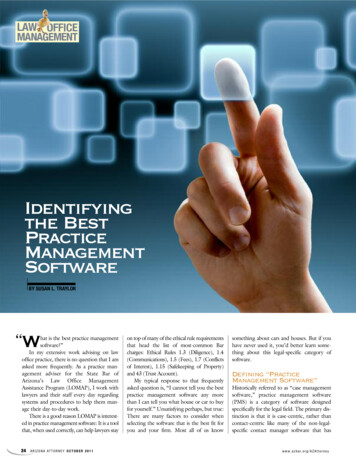
Transcription
LAW OFFICEMANAGEMENTIdentifyingthe BestPracticeManagementSoftwareBY SUSAN L. TRAYLOR“What is the best practice managementsoftware?”In my extensive work advising on lawoffice practice, there is no question that I amasked more frequently. As a practice management adviser for the State Bar ofArizona’s Law Office ManagementAssistance Program (LOMAP), I work withlawyers and their staff every day regardingsystems and procedures to help them manage their day-to-day work.There is a good reason LOMAP is interested in practice management software: It is a toolthat, when used correctly, can help lawyers stay24A R I Z O N A AT T O R N E Y O C T O B E R 2 0 1 1on top of many of the ethical rule requirementsthat head the list of most-common Barcharges: Ethical Rules 1.3 (Diligence), 1.4(Communications), 1.5 (Fees), 1.7 (Conflictsof Interest), 1.15 (Safekeeping of Property)and 43 (Trust Account).My typical response to that frequentlyasked question is, “I cannot tell you the bestpractice management software any morethan I can tell you what house or car to buyfor yourself.” Unsatisfying perhaps, but true:There are many factors to consider whenselecting the software that is the best fit foryou and your firm. Most all of us knowsomething about cars and houses. But if youhave never used it, you’d better learn something about this legal-specific category ofsoftware.Defining “PracticeManagement Software”Historically referred to as “case managementsoftware,” practice management software(PMS) is a category of software designedspecifically for the legal field. The primary distinction is that it is case-centric, rather thancontact-centric like many of the non-legalspecific contact manager software that hasw w w . a z b a r. o r g / A Z A t t o r n e y
ITALIANESTRO SHUTTERSTOCK.COMSUSAN L. TRAYLOR is the Practice Management Advisor for the State Bar of Arizona LawOffice Management Assistance Program (LOMAP). She is a certified consultant for AbacusLaw, Amicus Attorney, LexisNexis Time Matters and Credenza. She provides free 30-minuteconsultations, and fee-for-service, onsite training and consultations on behalf of the LOMAP.illustration 1CaseManagementSoftware s/DeadlinesPhone callsEmailsNotesTime trackingDocuments (assembly and management)Examples of traditional case managementsoftware are Abacus Law, Amicus Attorney,Time Matters, Practice Master, Legal Files,Client Profiles, ProLaw, Perfect Office,Daylite (Mac), Lawstream (Mac). (For detailon a wide variety of such software, see thetable on page 32.)See illustration 1 above.Two Parts of the OfficeTwo other important concepts to understand are “front office” and “back office.”If you think about the traditional lawfirm, the lawyers, paralegals, secretaries andclerks handle people, phone calls, email,document-generation, document-manage-flooded the market.Lawyers work on cases (or matters orfiles). Although the client (a contact) maycontinue on for years, it is the case that hasa beginning, middle and an end. There arepeople (other contacts), communications,documents, due dates, appointments, billable time, all related to the case.Likewise, the lawyer may represent thesame client for different cases, either simultaneously or sequentially, all of which caseshave related (or linked) people, communications, documents, due dates, appointments and billable time.w w w . a z b a r. o r g / A Z A t t o r n e yment, date-setting, appointments and billing time tracking. These functions arereferred to as front office.Typically, the time, billingand accounting functions(bills, expenses, payments,trust account, general firmaccounting, and so forth)were handled by one or twostaff in the firm (i.e., thebookkeeping staff or accounting department). These functions are referred to as backoffice. Software developedspecifically for this back office functionbecame popular independently from thefront office (or case management) software.Examples of back office software that dotime, billing and accounting functions areLexisNexis’ PCLaw, Juris, AbacusAccounting,AmicusAccounting,QuickBooks Pro, LexisNexis’ BillingMatters. Those that do time and billing areTabs3/Tabs3 Trust Accounting, TimeSlips,EasyTimeBill/EasyTrust, Amicus PremiumBilling, Tussman, Bill4Time, BillQuick andmore.(For detail on a wide variety of timebilling software, see the table on page 36.)See illustration 2 below.illustration 2Cases/Matters/FilesCaseManagementSoftware ContactsAppointmentsTo-dos/Tasks/DeadlinesPhone callsEmailsNotesTime trackingDocuments (assembly and management)Front Office CaseManagementSoftwareBack Office Time/Billing &AccountingO C T O B E R 2 0 1 1 A R I Z O N A AT T O R N E Y25
LAW OFFICEMANAGEMENTAs case management software grew inpopularity, so grew a demand for the frontoffice software to “talk to” (integrate with)the back office software. As a result, frontoffice software developed “links” to the various back office software. That way, youcould continue using your preferred backoffice solution, and simply add to it frontoffice features, or vice versa.The Contact and Case information is typically shared in both directions, whereas thetime records are unidirectional. That is, oncetracked in the front office, the time recordsare sent to the back office. Eventually, manyof the practice management (front office)software developed their own back officesoftware so that everything would be seamless to set up and so that front office andback office software would play nicelytogether. In some situations, the back officeis built-in to the front office; in other situations, it is a separate program or moduleSee illustration 3 below.illustration 3PRACTICEManagementSoftware Case Management Software(Front Office) Time/Billing & Accounting(Back Office)In summary, PMS today is most commonly used to describe the front office functions, either with a built-in back office functionality or the ability to “link with” (or talkto) another software designed to handle theback office functions.Traditional SolutionsMeet Modern TrendsThe PMS solutions discussed previouslyhave been around for many years. Those traditional solutions are software that you purchase, install on your server and/or computers in your firm, and you own the softwareand the data you put into the software. Youtypically subscribe to an annual support plan26A R I Z O N A AT T O R N E Y O C T O B E R 2 0 1 1with the vendor and, if you are doing it correctly, you also pay for initial training and initial setup help. Depending on your needs, aswell as the particular software you purchase,you may need routine customization andmaintenance of that software. The vendorperiodically announces software upgrades, atwhich time you wonder whether you needto upgrade or not.Over the past four years, several new PMSoptions have appeared on the market. Thesenewer solutions have taken advantage of therecent acceptance of cloud-based technology(aka SaaS or Software-as-a-Service), wherethe vendor holds both the software and thedata, and the user merely subscribes on amonthly basis to use the software.The SaaS solutions are appealing becausethe firm does not need to invest in high-endservers and does not have to invest in ongoing maintenance and upgrades. In addition,the software is accessible from anywherethere is Internet access, and many of thesolutions have time, billing and trustaccounting functions built-in with the frontoffice functions.Though the SaaS solutionsare ahead of the traditionalsolutions on mobility (cloudbased access from anywhere),some of the SaaS products areslow to develop documentassembly and email integration, features that are standard in traditional PMS.Examples of these SaaS orcloud-based practice management solutions are Clio,Rocket Matter, HoudiniEsq,LexisNexis’ Firm Manager,Abacus Sky, ProTempus,completeLaw Web and LiviaLegal.In effort to compete with the attractivemobility functionality of the cloud-basedsolutions, many of the traditional PMS havedeveloped features that allow users to accesscontacts, cases, appointments, to-dos, time,and/or expenses from their smartphones.Examples of this are Amicus Mobile,LexisNexis Time Matters Mobility.Practice-Specific PracticeManagement SoftwareIf you practice in a specific area of law, thereis software designed specifically for yourpractice area. That is not to say that generic,out-of-the box software cannot be cus-tomized to accommodate these specificpractice areas (and some even offer practicespecific modules at an additional charge). Itsimply means that if you are practicing inone specific area, and that area only, it maybe a good idea for you to start by researching those software options first.Keep in mind that some of these practicespecific solutions may not include all of thebasic features of the out-of-the-box traditional PMS. Examples of practice-specificsoftware are ImmPro, LawLogix, (immigration), BestCase (bankruptcy), Needles,TrialWorks (personal injury), Justware (public law) and Serengeti (corporate legal).What PracticeManagement Softwareis NotWhen the American Bar Association’s LegalTechnology Resource Center performed asurvey of law firms, asking them which PMSthey used, a large percentage of firmsresponded that they use Outlook. AlthoughOutlook may be a great tool in helpinglawyers manage their day-to-day schedules,deadlines, contacts and emails, it does notfall under the category of PMS. It is contactcentric software, not case-centric software.(Note: The exception to this is anOutlook “plug-in” called Credenza, whichadds case-centric functionality to Outlook.Credenza is a hybrid type of SaaS. Althoughyou must subscribe to the software, which isadded to your Outlook, you always retainthe active data in a file on your computer.)Many lawyers confuse PMS with document management software (DMS). In thequest to go paperless, many firms are looking for software that will help them managedigital documents. But while many PMS dohave DMS capability built-in or have theability to link with many DMS, most DMSdo not have in practice management capability. So although your DMS solution maygo far to take you to the paperless law office,it will fall short of helping you stay on top ofthose ethical rules on diligence, communication, fees (time tracking) and conflicts.Examples of Document ManagementSoftware are Worldox, iManage/Autonomy,OpenText and NetDocs.There is yet another category of law practice software called “litigation support” software. This is software designed to managelitigation documents (e.g., evidence, depositions, annotations). Though some of thew w w . a z b a r. o r g / A Z A t t o r n e y
LAW OFFICEMANAGEMENTPMS may integrate with litigation supportsoftware, litigation support software is moreclosely related to DMS and does not havethe features of PMS. Examples of litigationsupport software are Summation,Concordance, Sanction, Trial Director,Vision and CaseMap.Finally, PMS does not mean GoogleApps, or Microsoft Office 365. Thoughthese may be very attractive because theyare free or inexpensive, they do providesome basic recordkeeping functions (calendaring, documents, communications). Andalthough they may have some features (likeGoogle voice) that are attractive and helpfulto lawyers starting a practice or transitioning to a paperless office, they are notdesigned specifically for law practice andtherefore would not be categorized as afull-featured PMS.How Do You Go AboutChoosing PracticeManagement SoftwareThat Fits?BASIC FeATUReSIf you really use your PMS, you will find thatyou “live in it” every day, as you do a house.Just as you would expect a house to havebasic features such as kitchen, bathroom,bedroom, living room and perhaps a diningroom, you should expect any good PMS tohave the following features: contacts,cases/matters/files, appointments, to-dos,automated calendaring, phone records, theability to save incoming and outgoing emailsand attachments, timekeeping, basic document assembly, basic document management, and billing and accounting or a linkwith billing and accounting software.DISTINGUIShING FeATUReSIn addition to basic features, you may prefera few bells and whistles, like a walk-in closetor three-car garage. Likewise, the PMS differ. It is in this area where you may begin toquickly narrow down your choices.Examples of distinguishing features are: particularly robust document managementfunctionality; notably user-friendly featureslike automated calendaring, documentassembly or conflicts of interest features;instant messages to be used within the firm;28A R I Z O N A AT T O R N E Y O C T O B E R 2 0 1 1ability to color-code the calendar entries;strong reporting capabilities; and ability tocreate your own record types.INTeGRATION WIThBIllING/ACCOUNTING SOFTWAReFor instance, you may be using Timeslips,PCLaw, Juris, Tabs3 or QuickBooks Pro foryour back office and prefer not to change.You would then need a PMS that plays nicely with that software.INTeGRATION WITh OUTlOOk, NOvellOR OPeRATING SySTeMS SUCh AS MACBecause smartphone (iPhone, Droid, etc.)and iPad/tablets are a major driving forcebehind the move to be mobile and gopaperless, this is one of the most importantissues to be considered when selecting PMSsolution for your practice.STANDOUT FeATURe(S)One of the ways the PMS compete witheach other is in the area of standout features—having one or more features that theother software do not have or do not do aswell. Examples: Abacus Law’s PDF FormFill, web-based intake form feature, or practice-specific Matter screens; Time Matters’tight integration with LexisNexis research ortimetable for setting up frequently useddeadline intervals; Amicus Attorney’sLibrary for storing and organizing firmresources, phone and email “inbox” called“ComCenter”; and ProLaw’s tight integration with Westlaw research.MOBIlITyHow do you want to work remotely withyour PMS? Will you have it installed at youroffice and merely need to “login” to accessinformation? Or will you be a mobile lawyerwho does not want to be restricted to a brickand mortar office? Will you use VPN(Virtual Private Network) or GoToMyPCor LogMeIn to log directly onto your computer from outside the office? Or do youhave a branch office that will routinely needto access the firm network? Does the PMSoffer different remote access options (e.g.,Terminal Services)?STyleJust as you may choose a house becauseyou like the layout or the windows or theyard, it is important that you choose a PMSsolution that appeals to you aesthetically.You will be opening your software everyday and “living” in it. Understandably, ifyou are not accustomed to working in adatabase or PMS, you may need some initial training to become familiar with how toget around in it, but you should get a goodsense of your comfort level in the softwareduring a free demonstration. If you haveother staff in your firm, consider their comfort level, too.TRAINING, SUPPORTSetup, implementation and training are keyto successfully using your software. With thetraditional PMS solutions, many vendors aretransitioning to a fee schedule that includesannual support and, in fact, requires that youmaintain that support on an annual basis.Typically, these vendors also provide manyoptions for training (e.g., bundled trainingsessions at the time of software purchase,web-based classes, local consultants who cancome to your firm, or trainers sent to youroffice). Some vendors give free webinartrainings.What is the Best PracticeManagement Software?The second-most frequently asked questionI receive about PMS comes from firms thatinsist a product they currently use cannotperform a particular function—so they wantto switch. More often than not, after a bit aresearch, we discover that in fact their software can perform that function. They simplydid not know it.The conclusion from all of this is thatthere are many excellent PMS solutions onthe market these days. Much of the successof any PMS solution is proper selection,setup, training and implementation.Ultimately, the best PMS is: The one that gets used The one that gets used effectivelyby everyone in the firm The one that accomplishes the requisite tasks (basic features of PMS) The one that plays nicely with yourother software and devices The one that stays competitive withtechnological developments The one that gives you a return onyour investment The one that is there when youneed it AZATw w w . a z b a r. o r g / A Z A t t o r n e y
LAW OFFICE MANAGEMENTPractice Management Software ProductsAs of August 29, 2011Abacus Law(800) 726-3339www.abacuslaw.comSimplify Your Practice: AbacusLaw is an all-in-one, easy to use solution designed specificallyfor law firms. With our fully integrated practice management software, you will be able to workmore efficiently, lower risk and improve client service legal calendaring software, contact management, case management, document handling, document production, conflict checks, phonemessaging, time capture, law office billing and accounting—so you can do anything and retrieveanything from one location AbacusLaw is the only software that can combine multiple practice areas so easily.Versions available in: AbacusLaw: front office only AbacusLaw Gold: front andback office Enterprise: Fortress version for differentPractice-Specific versions forseveral practice areas.Contact vendor for price quote.Abacus Sky(800) 855-222-2878www.abacuslaw.comSaaS (Software as a Service)See vendor website for more detail.Abacus Sky comes with AbacusLaw (see above) Microsoft Office and Outlook, a MicrosoftExchange Server, state-of-the-art security, daily back-ups and 24/7 management. Easily add anyother software you wish.Amicus Attorney(800) 482-9227www.amicusattorney.comAmicus Attorney is designed to help legal professionals improve the efficiency and profitability oftheir firms and to help them get the most out of the time they spend practicing law. Designedby lawyers for lawyers, this world leading software provides a comfortable, familiar environment. Manage every aspect of your practice from Files, to Contacts, to Calendaring, to TimeTracking, E-mail to Phone Calls, Documents to Research.Small Firm Edition ( 10 Users): 499/1st User 399/Ea Add’l UserPremium Edition ( 10 Users): 999/1st User 599/Ea Add’l UserAmicus Small Firm Accounting: 399/1st User 299/Ea Add’l UserAmicus Premium Billing: 199/UserAmicus Mobile: Server: 499/User Licenses: 149/UserClient profiles(Case Management)(770) 640-0300www.clientprofiles.comProviding solutions that span a suite of product offerings including Case Management, FinancialManagement, Document Management, Client Relationship Management (CRM) and DocumentImaging. Whether your law firm’s area of practice is Personal Injury, Workers Compensation,Insurance Defense, Litigation or Transactional, to name just a few, Client Profiles is ready to provide a technology solution that is tailored to meet your specific needs.See vendor website for more detail.Clio(888) 858-2546www.goclio.comSaaS (Software as a Service)Completely web-based, Clio is a practice management system that is specifically designed for solopractitioners and small law firms. Your important client data is securely accessible anywhere—from your PC, your Mac, and even your iPhone.Monthly Subscription Fee: 49/mo per attorney 25/mo per support staffcompleteLaw(877) 283-9035www.completelaw.comFrom case management, client files, contacts, and calendars to time tracking, billing and accounting integrates all major functions syncs with Outlook server or web-based document management Law Web in the cloud also available for Workers Comp Personal Injury.See vendor website for more detail.completeLaw – Web(877) 283-9035www.completelaw.comSaaS (Software as a Service)Set up a Virtual Office – Office without walls. All persons stay connected with each other from anywhere. Manage tasks, appointment, court appearances, billings, and documen
software,” practice management software (PMS) is a category of software designed specifically for the legal field. The primary dis-tinction is that it is case-centric, rather than contact-centric like many of the non-legal-specific contact manager software that has W hat is the best practice management software?” In my extensive work .
